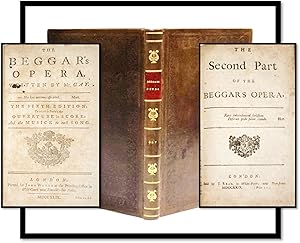About this Item
Modern full calf leather with a floral blind-stamped borders the spine with compartments with harp designs and a red leather title, renewed endpages. Contains illustrated title page and numerous musical scores for each song as well as the overture. The bindings are tight and square. Text clean, light even toning. Moderate shelf handling wear. 8vo; 8 inches tall; delicate edges to the first few pages, some age-related blemishes through-out. The Beggar's Opera with the ouverture in score; and the musick prefix'd to each song. 76 pages followed by 8 pages of other books published by John Watts with brief synopsis of each. The first edition had the score on 16 pages at the end, here the music is printed in the text in woodcut. Second Part of the Beggars Opera. v, [ 1 ], 70. This a pirated edition of Polly, Gay's sequel to the Beggar's Opera. Published Anonymous. By John Gay. Also known as Polly and is a ballad opera with text by John Gay and music by Johann Christoph Pepusch. It is a sequel to Gay's The Beggar's Opera. Due to censorship, the opera was not performed in Gay's lifetime. It had its world premiere on 19 June 1777 at the Haymarket Theatre in London. Provenance: From the private collection of Anton Vishio, Sr. a scholar and mentor. He taught Latin and Classical Greek at the Gilmore School in Baltimore for 45 years. Ref: ESTC ESTC,; T13803; Old English plays noted bibliographically and biographically. London: Pickering & Chatto, [1909],; page 63, item no. 536. Background Information: The Beggar's Opera, written in 1728 by John Gay with music arranged by Johann Christoph Pepusch, is a notable ballad opera in three acts. This play holds great significance in the realm of Augustan drama and stands as the sole enduring example of the once flourishing genre of satirical ballad opera. The primary aim of this piece was to satirize the burgeoning popularity of Italian opera in London. As aptly described by The New York Times, Gay crafted the work as an anti-opera, cleverly exploiting the public's fascination with the Italian opera style prevalent in 18th-century London. By lampooning this style, The Beggar's Opera captivated audiences with its wit and irreverence. In contrast to the grandeur and lofty themes of traditional opera, Gay's work relied on familiar tunes and portrayed characters from everyday life. While some of the songs were composed by notable opera composers such as Handel, only the most popular melodies were included. This deliberate choice allowed the audience to hum along, forging a connection with the music and characters on stage. Central to its narrative, The Beggar's Opera satirically tackled political corruption, poverty, and social injustice, permeating all levels of society. Through its biting commentary, the play shed light on the pervasive nature of corruption, exposing its presence in various strata of society. Overall, The Beggar's Opera not only served as a parody of Italian opera but also offered a critical examination of societal issues. By blending accessible music, relatable characters, and astute satire, this enduring piece continues to captivate audiences and maintain its relevance to this day. The Second Part of the Beggars Opera (Polly) Similar to its predecessor, Polly also faced censorship during its time. The production was prohibited by the Lord Chamberlain, the Duke of Grafton, most likely influenced by Walpole. However, rather than negatively impacting Gay, the censorship served as exceptional advertisement for the play. In 1729, Polly was published through a subscription model, leading Gay to earn a substantial sum of money. Although Polly did not see the light of day on stage during Gay's lifetime, its censorship was more severe compared to the first play. Walpole deemed the satire in Polly to be far more explicit and potent. Consequently, the Lord Chamberlain banned the play from even entering the rehearsal stage, labeling it as a lewd and defamatory work. It is worth noting that the. Seller Inventory # 17048
Contact seller
Report this item
![]()




